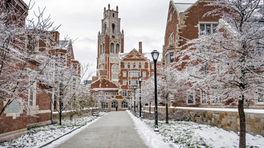Do What Matters: How to Make Your Extracurriculars Stand Out for College Applications
- Aiden Puccio, College Admissions Counselor
- Aug 7, 2025
- 3 min read
August is here and school is right around the corner! With another year starting, students should be carefully planning how they’ll spend their time outside of the classroom.
Extracurricular activities like school clubs, community volunteering, job shadowing, research, and internships are great ways to explore personal and academic interests while gaining valuable skills and experience. Meaningful participation in extracurricular activities also enables leadership development and provides an avenue to build strong relationships with mentors and supervisors who can serve as recommenders in the future.
So, how should students select their extracurriculars and determine what activities are worthwhile? Today, we’ll offer some guidance on this topic!
Get involved at school!
Colleges want to see students engaging with their community and their peers—getting involved at your high school and being active in clubs can help show you share this value.
From HOSA (Future Health Professionals) to Animation Club and Outreach Club, most schools will have plentiful groups structured to help students make a difference on campus and beyond. Attend club fairs and review school resources like websites and social media accounts for clubs that can help you gain exposure to a wide variety of opportunities at any level (remember to join clubs early as some activities may close membership after a certain point in the year).
Upperclassmen will also have the chance to run for leadership positions, especially if they’ve been members for multiple years. Students can plan ahead for future elections by connecting with current officers, building good relationships with club supervisors, asking questions about the election process, and evaluating different available roles to see which responsibilities most suit them. Offering to provide extra help planning events, starting a new project, and encouraging others to join can also help demonstrate leadership before having an “official” position.
Can’t find a club that fits your interests? Look into starting your own! Founding a club is a great way to gain leadership experience and build a community dedicated to a shared passion. Even without official school sanction, students can still organize and run informal student organizations and events.
Look for opportunities outside the classroom
After finalizing school-related extracurricular plans, students should also look into activities outside of school, such as volunteering, research, or internships. Identify a local nonprofit or organization with a cause you care about. Polish your resume and email professors to ask about openings in their labs. Visit local businesses to offer your skills in an internship. To build a well-rounded and multi-dimensional profile, students should take initiative over these independent learning opportunities.
Be prepared for fall competitions and program applications
Another way to provide evidence of a student’s level of knowledge and skill in a specific area is through awards and honors. These can be related to community service, academics (honors societies), professional skills, or major-related events like DECA, debate, HOSA, science fairs, math competitions, USACO, and more. Start researching competitions and prepare early—many events and deadlines are in the fall!
For example, check out the Texas regional and state-level science fair requirements and schedules. In Spring 2025, regional fairs took place in February: this means that students need to begin developing their projects and connect with mentors now in order to produce quality work. Many other activities like robotics, speech & debate, and performing arts also begin preparations for the year’s competitions early in fall.
In addition to competitions, students should also keep track of upcoming summer programs and internship applications, some of which have fall deadlines. While most summer programs accept applications through spring, some may catch students by surprise due to how early they come within the fall semester. NASA’s Texas High School Aerospace Scholars program has an application due date of September 24. Similarly, The Conrad Challenge, which focuses on Aerospace & Aviation, Cyber-Technology & Security, and Energy & Environment, has a November team registration deadline.
How to make your activities stand out to admissions officers
Overall, it’s beneficial for students to prioritize quality of commitment over quantity. It may seem impressive to be a part of 10 school clubs, but if you're only participating as a general member as a way to "build up" your resume, you risk not making memorable contributions. Instead, serving in leadership roles for 3 clubs that require more in-depth planning, management duties, and outside responsibilities could be more compelling to college admissions officers.
This approach, in combination with unique experiences that show the student took initiative, will help demonstrate the leadership and high-level impact colleges are looking for.
B2A’s Steps Program connects students with counselors who can advise them on which extracurriculars to participate in as well as how to deepen their involvement through both official and unofficial roles. Rising seniors in the Gateway Program work with counselors to highlight their most impressive academic and personal involvements in a way that solidifies their college application themes.
To learn more about these programs and other advising options, contact our front desk.
































